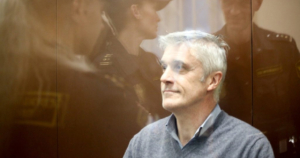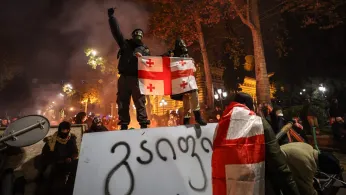
Foreign investment test case ends with Calvey conviction

More than two and a half years after the arrest of Michael Calvey — the founder of Russia-focused private equity fund Baring Vostok — one of the most symbolic legal cases for Russia’s investment climate has finally come to an end. A judge found Calvey guilty Friday, handing him a five-and-a-half-year suspended sentence.
- It took two full days for the judge to read out the verdict in the Baring Vostok case — and he only finished at 10:40 p.m. on Friday. In the end, Calvey was convicted of embezzling 2.5 billion rubles from Vostochny Bank and given a suspended sentence of five-and-a-half years. Fellow defendants from Baring Vostok also received suspended sentences.
- Throughout the proceedings, Calvey maintained his innocence. “Against the background of most of these cases, getting a suspended sentence is almost a victory,” he said in comments Friday referring to Russia’s high conviction rate. “But on the other hand, it is outrageous to be convicted of a crime that never took place. The accusation of embezzlement is deeply offensive to me as a professional investor who has earned a reputation for honesty over 25 years of work. I consider this verdict to be deeply unjust and regrettable.”
- A mediator in the conflict between Calvey and Artyom Avetisyan, Baring Vostok’s ex-partner in Vostochny Bank told that the outcome had been agreed when Calvey made amends of the ‘damages’ he was supposed to have caused. “To the best of my knowledge, the applicant [Avetisyan] also hopes for a suspended sentence. At the very least, he has said that he has no further complaints and that he considers the conflict settled,” the source said. Avetisyan’s only public comments on the Baring Vostok case were back in 2019.
- Financial compensation for the 2.5 billion rubles allegedly embezzled by Calvey and his colleagues was agreed as a part of a settlement between Baring Vostok and Avetisyan’s Finvision company last October.
How the case unfolded
- Calvey and his co-defendants were arrested on February 15, 2019. Calvey spent almost two months in custody before being moved to house arrest. Over the following year, the other defendants were also transferred to house arrest.
- Many top business figures quickly spoke out publicly about Calvey’s good reputation and the damaging impact of the Baring Vostok case on Russia’s investment climate. Among others, calls for Calvey’s release came from the head of Sberbank, German Gref; 1990s privatization mastermind Anatoly Chubais; and the head of the Russian Direct Investment Fund, Kirill Dmitriev, who also put up a surety before the court on Calvey’s behalf.
- The case arose from a 2016 conflict over Vostochny Bank, Russia’s 39th largest bank, following a merger of Baring Vostok’s Vostochny Express Bank and Avetisyan’s Uniastrum Bank. That deal gave Baring a 52 percent stake in the merged entity, while Avetisyan and his partners held 40 percent with an option for another 9.9 percent.
- When that option was due, Baring refused to honor it. In court, Calvey said there was evidence Uniastrum had carried out asset-stripping prior to the merger.
- The crux of the case was a transaction in which Vostochny Bank accepted shares onto its balance sheet from Luxembourg-based IFTG. These shares were a repayment of a loan issued by the First Collection Bureau, part of Baring Vostok. According to Baring Vostok, the market value of the shares was 4.5 billion rubles; the plaintiffs insisted the shares were worth just 600,000 rubes.
- After Calvey’s arrest, Baring Vostok lost a separate Russian court case over Vostochny Bank and was obliged to relinquish control. Earlier this year, the bank was sold to Sergei Khotimsky’s Sovcombank.
Why the world should care: There are many reasons for the woeful state of Russia’s investment climate and it’s hard to assess the exact impact of the prosecution of Calvey, a renowned investor who has channeled billions of dollars into Russia and given a start to corporate giants like Yandex and online marketplace Ozon. But the threat of jail time resulting from a corporate conflict will likely deter investors for many years to come.



